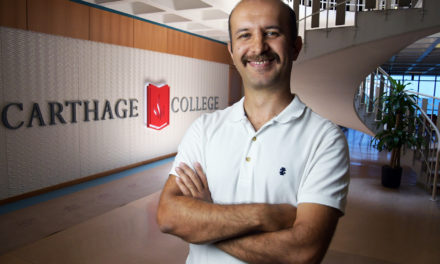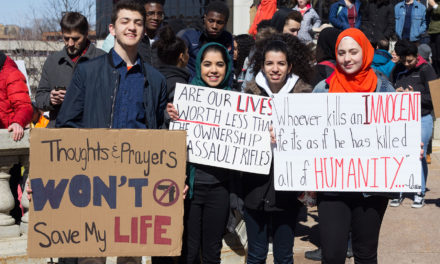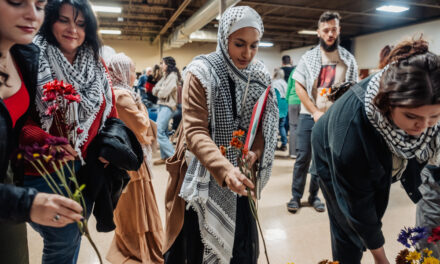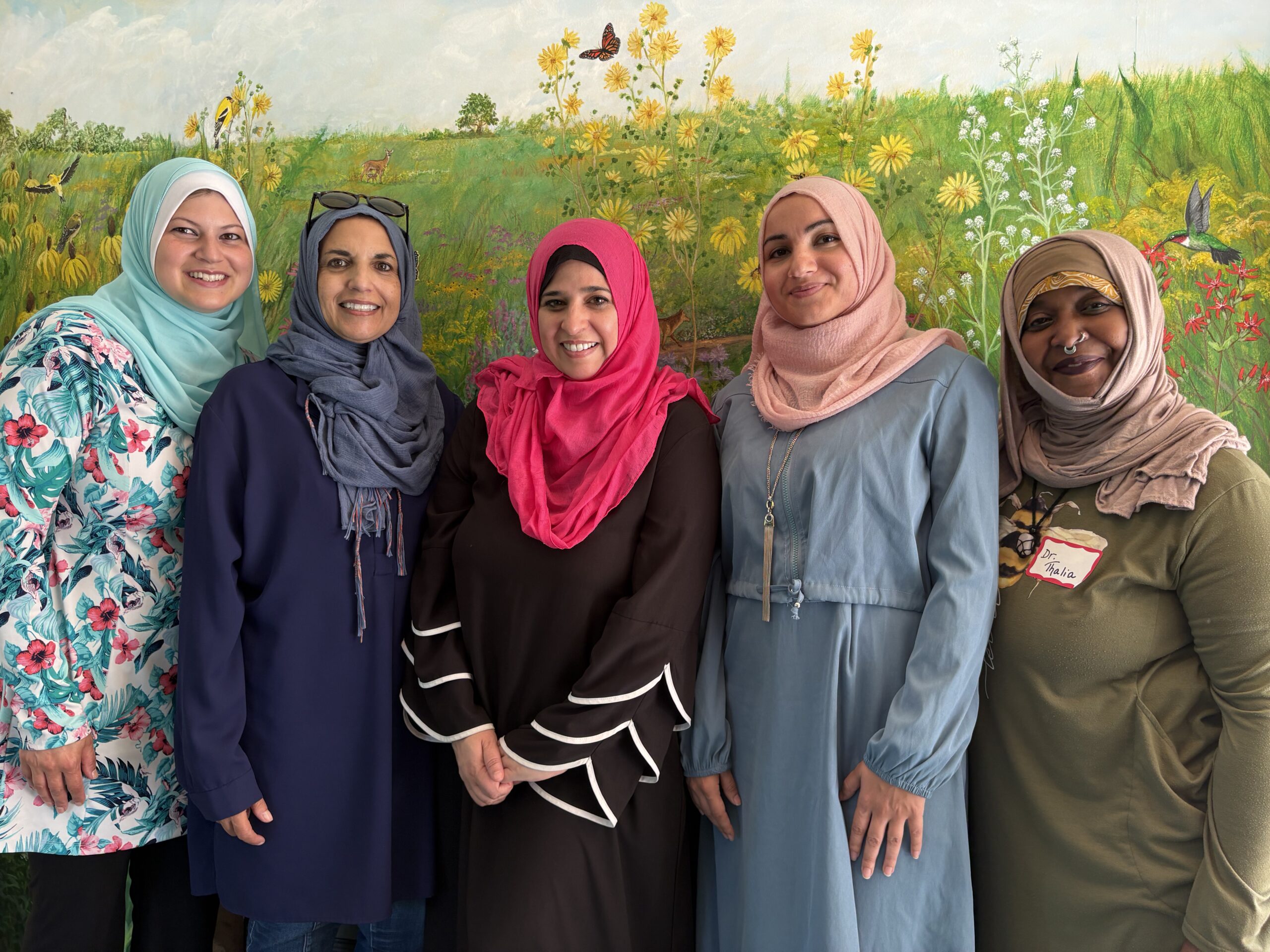
Photos by Cherrie Hanson
SIHA (Striving to Improve Health for All) founding members, left to right, Laila Azam Ph.D., Amal Jaber, M.E., Fauzia Qureshi, B.S., Islam Elayan, M.S.N., and Thalia Williams, Ph.D., came together in 2018 to develop public health leadership in Wisconsin.
Need a safe space to be yourself and talk about what’s really on your mind? You might consider an outing with SIHA, which stands for “Striving to Improve Health for All.”
Emotional wellbeing is key to good health, the five SIHA board members agree. It begins with peace of mind, they say.
But it’s not something you can create in a vacuum. People need “safe spaces where we can talk openly about our struggles without fear of being judged, misunderstood or stigmatized,” said SIHA president Fauzia Qureshi, a leader in statewide efforts to advance civic engagement, leadership development and mental health awareness within Wisconsin’s Muslim communities.
“We have to be able to give our children and our community that space for when their emotional wellbeing is not where it needs to be,” added SIHA board member and longtime educator Amal Jaber, M.E.
Wisconsin Muslim Journal met with SIHA’s board to learn how a handful of Muslim women from diverse professional backgrounds joined forces “to empower Wisconsin Muslims toward a holistic sense of wellbeing, encompassing a healthy mind, body and spirit,” as SIHA’s vision statement puts it.
The nonprofit’s unique collaboration of advocates, educators and healthcare professionals work to create a lasting impact on Muslims’ health through research, education, advocacy, community empowerment and resource sharing, its mission statement says.
Safe spaces and nurturing activities
Next week SIHA hosts its second community activity, a sisters-only guided hike called Fall into Transformation: Finding Your Inner Peace.” Wisconsin Master Naturalist (and WMJ’s managing editor) Cherrie Hanson will lead a guided hike that begins at Boerner Botanical Garden’s Garden House, 9400 Boerner Dr., Hales Corners. The event Saturday, Nov. 8, from 1 – 3 p.m., includes mindful walking, guided reflection and a discussion of faith-based wellness tools, and tea with a charcuterie board. For sisters 20+, the fee is $10. Register here.
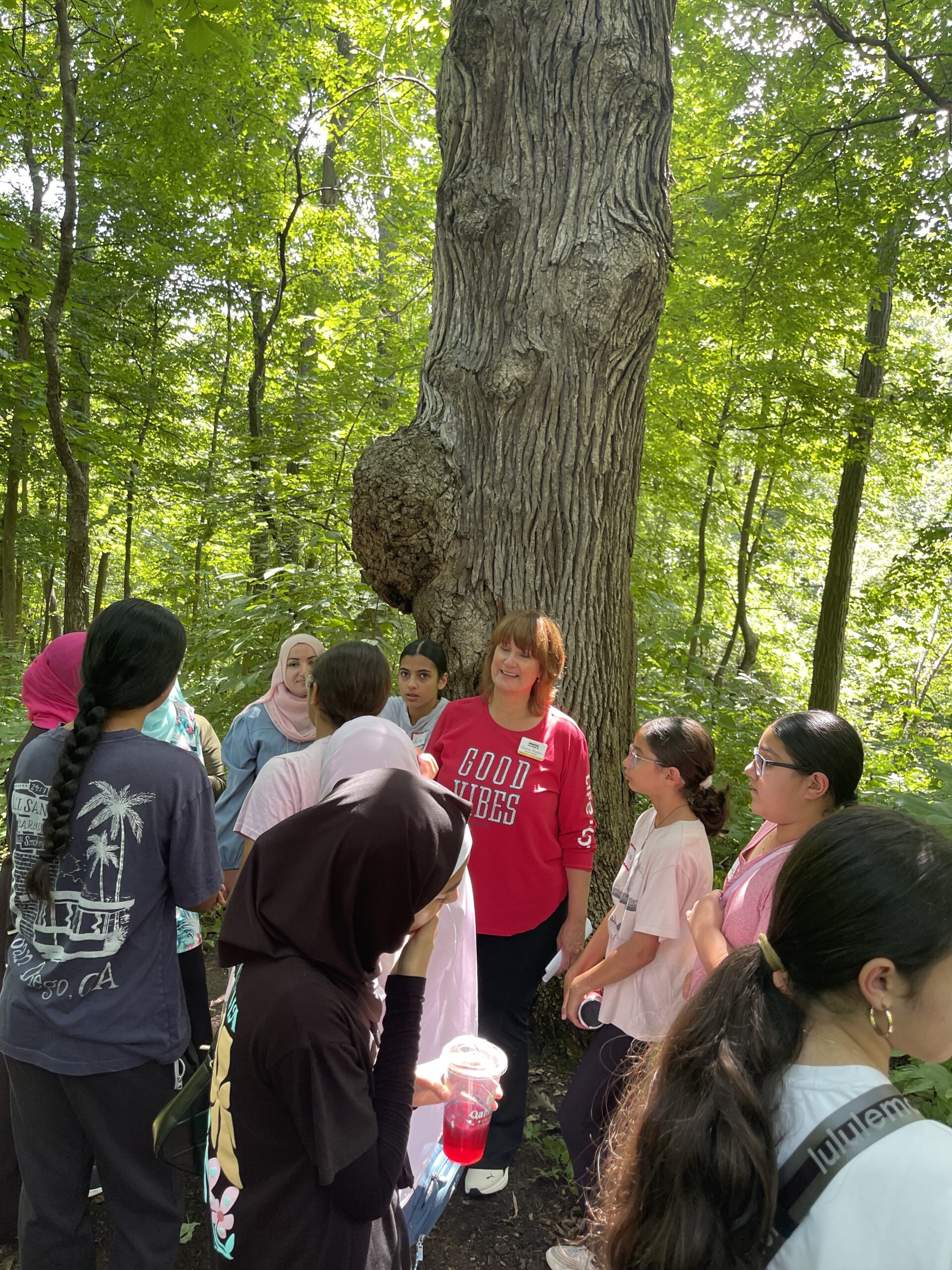
Photo courtesy of SIHA
Guide Cherrie Hanson led teens on a hike in Wehr Nature Center’s 220-acre preserve.
SIHA’s first event, Nature & Nurture: A Girl’s Wellness Walk, in August at the Wehr Nature Center in Franklin, invited Muslim girls, 11-15 years old, for “an afternoon of sisterhood, reflection and connection in nature,” its flier said. Participants explored nature, reflected on Islamic teachings about friendship and had an opportunity to make new friends.
“It focused on the heightening stress and feeling of isolation our youth have, especially since COVID,” said Jaber, a teacher and reading specialist at Salam School in Milwaukee for 20 years, who later founded an early childhood development center to support children in their foundational years. “Our hope was to create a safe space at the intersection of friendship, faith and emotional health, where youth could become friends and focus on their emotional wellbeing.”
SIHA hopes to host more events at the Wehr Nature Center, Jaber added. “We were happy to be there and they were excited about us being there.”
Hanson, who also led a guided walk at SIHA’s first event, said the natural setting is an important addition. “Nature is often thought of as a backdrop or decoration but it is evidence of higher laws of the Creator,” she said. “I want to teach people how to connect to this, replacing fear with fascination.”
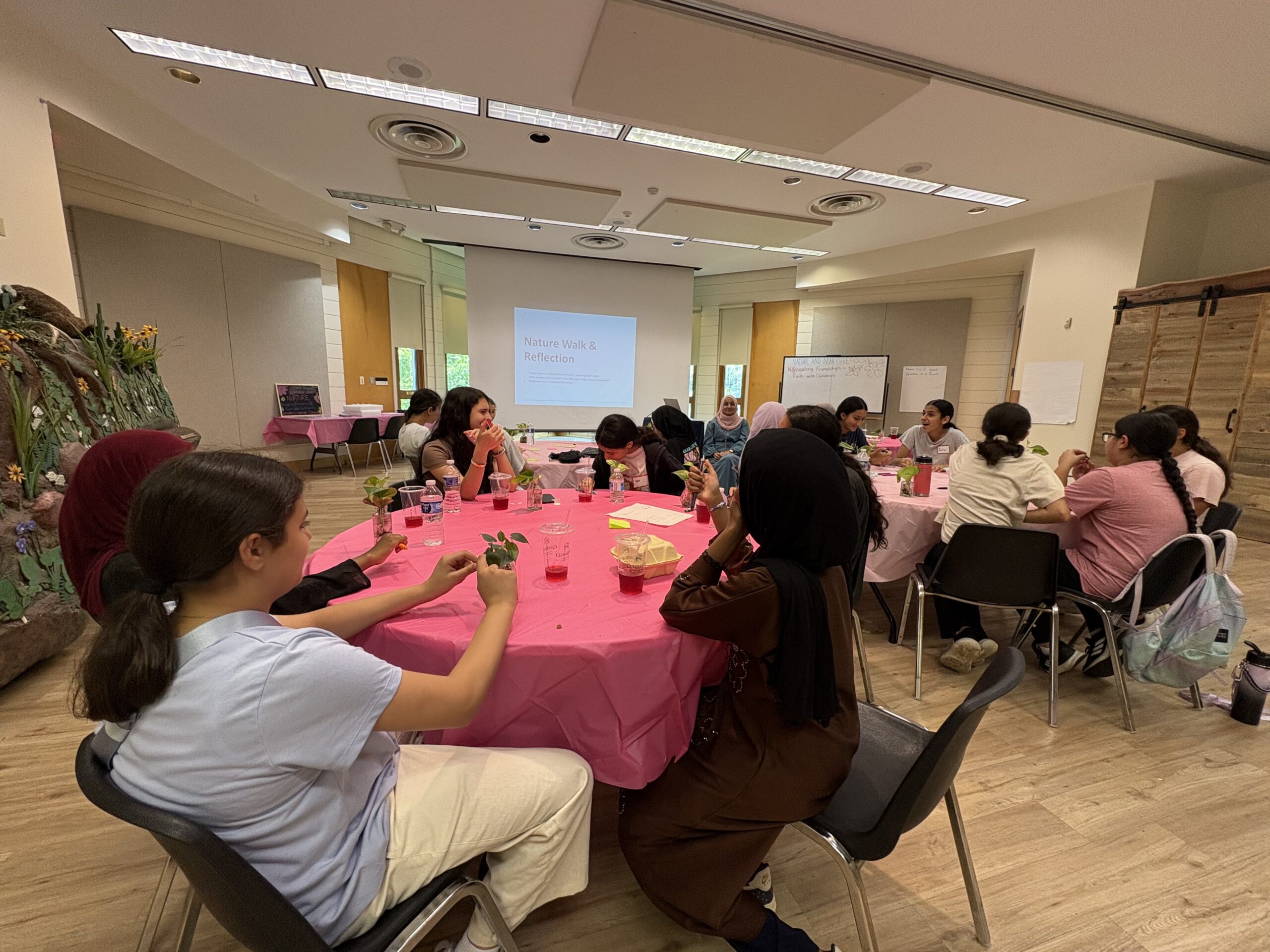
SIHA hosted an event in August for 11-15 year old Muslim girls with a guided hike and reflection on Islamic teachings about friendship.
Creating space for growth
SIHA “was born from our shared recognition that our community needs a safe space to talk about mental health without stigma,” said Islam Elayan, M.S.N., who is currently training to be a psychiatric mental health nurse practitioner.
“We want to create safe spaces to openly talk about our struggles,” Qureshi added.
“It is difficult in such a close-knit culture,” replied Elayan. “The other challenge that’s unique to Muslims in America is that we often have limited access to culturally competent healthcare professionals.”
“As Muslims, we don’t like that term ‘mental health,’” Jaber noted. “We’ve started using the term ‘emotional health and wellbeing’ to help people move away from that stigma.”
“That stigma keeps us from having open conversation and dialogue,” Elayan said. “We don’t want others to know we have struggles. We don’t want to appear weak. SIHA wants to change that by saying, ‘You are not alone. Your struggles are valid. We are in this together. We can find healing together.’”
SIHA’s founding members united in 2018 to answer a call from the Healthy Wisconsin Leadership Institute for teams to come together to help develop public health leadership in Wisconsin, said Laila Azam, Ph.D., a public health researcher and educator at the Medical College of Wisconsin, who was instrumental in putting the team together.
“What makes us unique is our multi-sector, evidence-based training,” Azam said. “We each bring a unique lens to the work we use to build capacity in the community.”
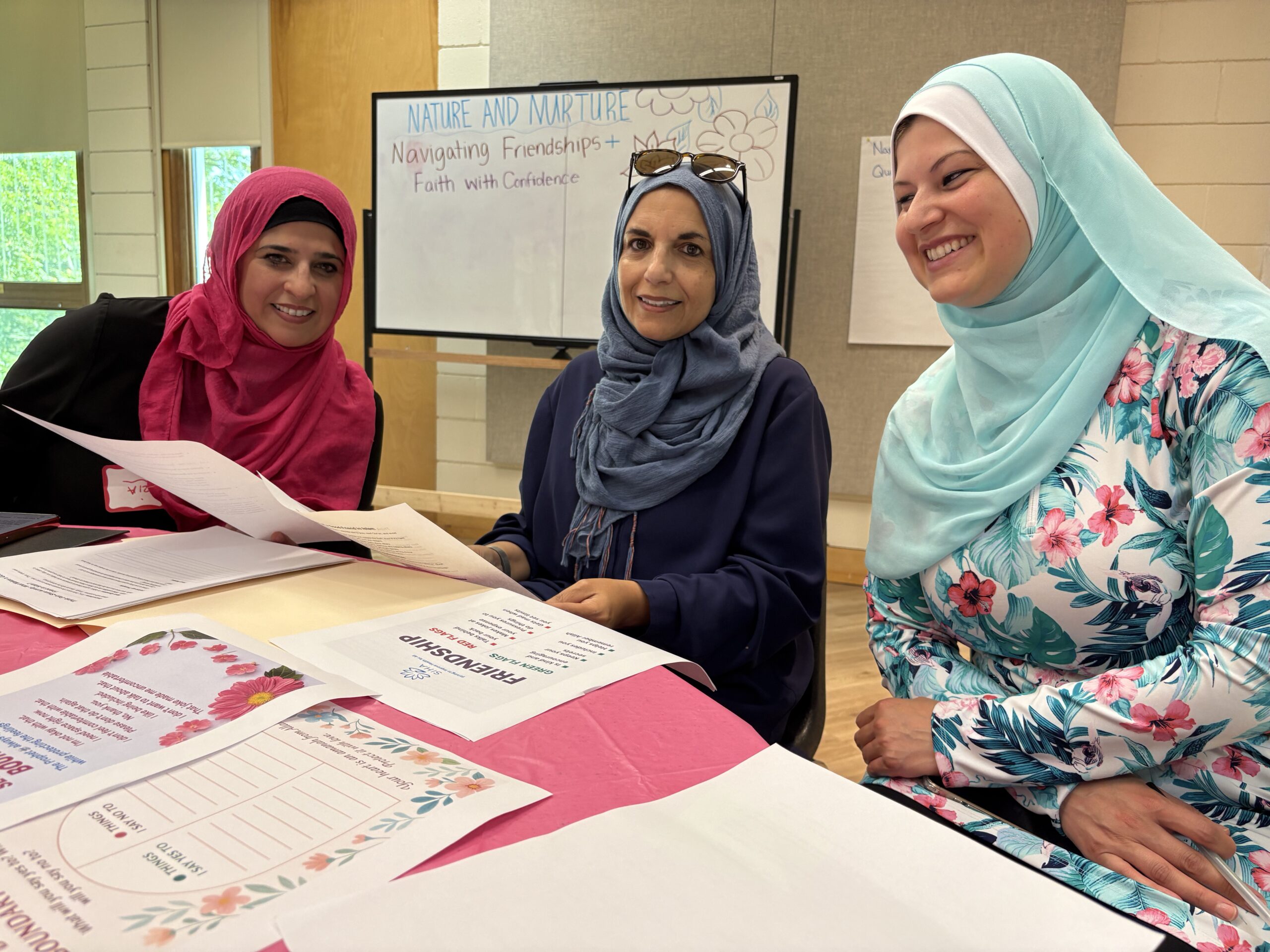
From left to right, Fauzia Qureshi, B.S., Amal Jaber, M.E., and Laila Azam, Ph.D., led a discussion with teens on navigating healthy friendships with faith and confidence.
“Fauzia’s background is in public policy in addition to public health. Islam has clinical experience. Amal is an educator with many years in the community, Dr. Thalia (Williams) brings expertise as an educator, program evaluator and clinical research administrator. And my background is in public health.
“Our different lenses and the framework we have created help us in terms of awareness of community needs,” she added. “We go to the community and let it define what it needs.”
HWLI awarded a grant to this dream team of professional women with their variety of education, skills and lived experiences. Through the HWLI grant, they ran a pilot project at Salam School to collect data on emotional and social health.
Although the funding dried up during the pandemic and despite their busy professional and family lives, the SIHA board decided to continue working together on Muslim wellness. They applied for and received non-profit status and launched a series of community programs this fall.
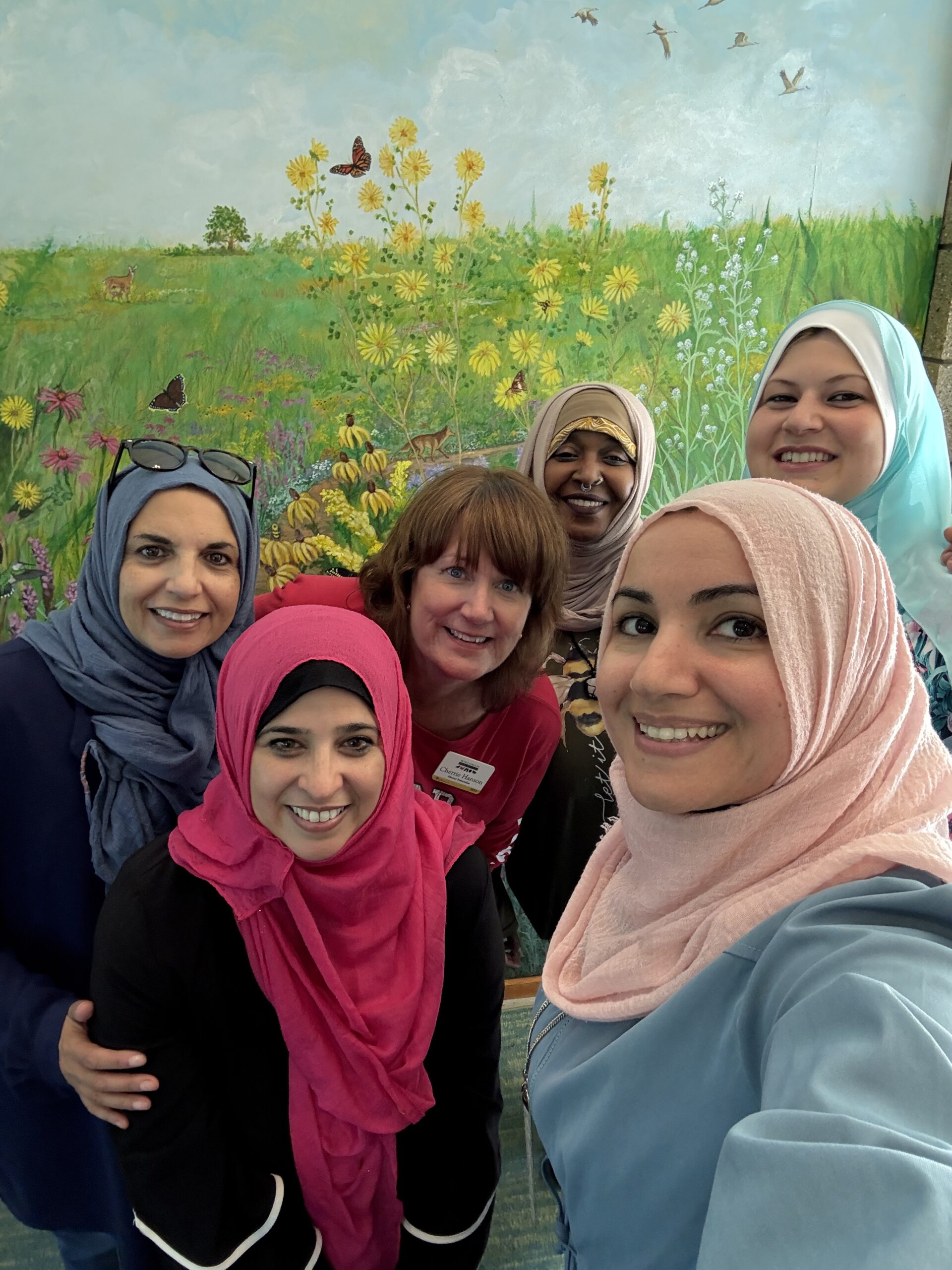
“All of us, mashallah, are very passionate about helping out in the Milwaukee Muslim community,” Azam said. “We want to keep this work going.
“We’re getting back to our original mission, to make change in our community’s wellness. We thought we could make the biggest impact with youth. That’s why, when we put our first program together, we started out with teens.”
“A number of Wisconsin’s Muslim organizations are focusing on mental health in the community,” Jaber said. “I hope they will see us as a resource and partner for building an emotional health network.”
“I would love to add the topics that are most relevant to Muslims at any stage,” Elayan said. “We are focusing on building relationships but in the future, it may be something else. A lot of Muslims are experiencing the geopolitical issues we are facing and want to be able to express our thoughts and feelings. I believe it is so important to have those safe spaces.”
The SIHA Board:
Fauzia Qureshi is the executive director of the Wisconsin Muslim Civic Alliance and the Wisconsin Muslim Civic Foundation, where she leads statewide efforts to advance civic engagement and develop leadership in Wisconsin’s Muslim communities. She holds a Bachelor of Science degree in Biology.
Laila Azam, Ph.D, M.B.A., is a public health researcher and educator at the Medical College of Wisconsin. She serves on the National Advisory Board of the University of Wisconsin–Madison Population Health Institute, contributing to statewide efforts to promote wellness and health equity across Wisconsin. She is a former board member of the Muslim Women’s Coalition.
Amal Jaber, M.E., an educator and community advocate with a Master of Education degree, taught at Salam School and later founded an early childhood development center to support children in their foundational years. She is a Muslim Women’s Coalition board member, supporting initiatives that uplift Muslim women’s voices and expand opportunities for growth and empowerment.
Thalia M. Williams, Ph.D., M.S.P.H., is a Distinguished Program Evaluator for Wisconsin Area Health Education Centers and M.D. Admissions and a mentoring support person at the University of Wisconsin-Madison School of Medicine and Public Health. She has a doctoral degree in epidemiology and graduate degrees in educational leadership and public health. She serves as an adjunct professor for the Helen Bader School of Social Welfare at UW-Milwaukee and for the Milwaukee Area Technical College Sociology Department – General Education Pathway Program.
Islam Elayan, M.S.N., is an integrative behavioral health clinician, training as a psychiatric mental health nurse practitioner and specializing in trauma-informed, mind-body approaches. With over two decades of healthcare experience, she integrates neuroscience, psychotherapy, and functional medicine to uncover and address the root causes of anxiety, mood disorders, and stress-related health conditions. As the founder of SomaState, she developed the SMILE-Rewire™ framework to strengthen nervous system resilience and foster lasting emotional well-being. She is also cofounder of Striving to Improve Health for All (SIHA), a Wisconsin-based coalition advancing mental health equity through culturally responsive, community-based initiatives.

